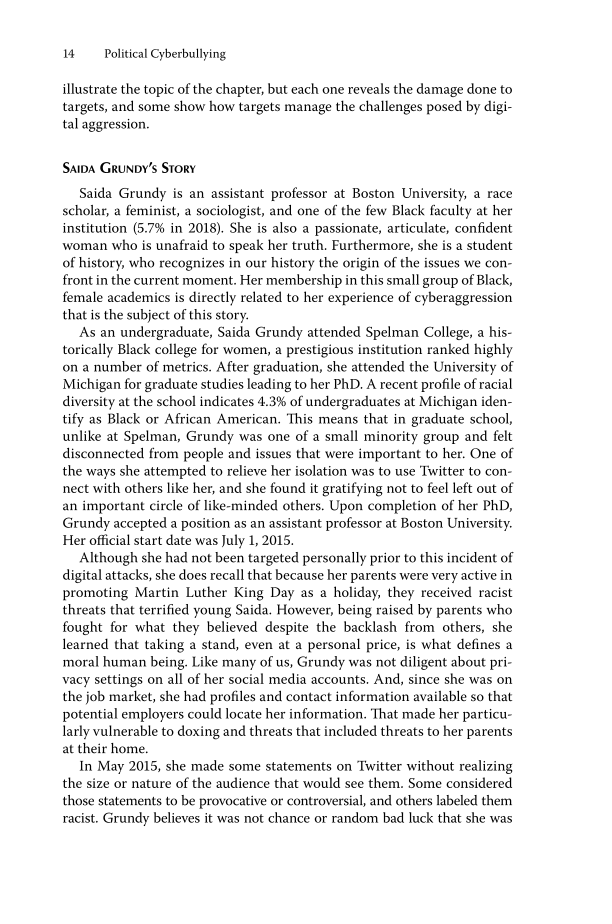14 Political Cyberbullying illustrate the topic of the chapter, but each one reveals the damage done to targets, and some show how targets manage the challenges posed by digi- tal aggression. SAIDA GRUNDY’S STORY Saida Grundy is an assistant professor at Boston University, a race scholar, a feminist, a sociologist, and one of the few Black faculty at her institution (5.7% in 2018). She is also a passionate, articulate, confi dent woman who is unafraid to speak her truth. Furthermore, she is a student of history, who recognizes in our history the origin of the issues we con- front in the current moment. Her membership in this small group of Black, female academics is directly related to her experience of cyberaggression that is the subject of this story. As an undergraduate, Saida Grundy attended Spelman College, a his- torically Black college for women, a prestigious institution ranked highly on a number of metrics. After graduation, she attended the University of Michigan for graduate studies leading to her PhD. A recent profi le of racial diversity at the school indicates 4.3% of undergraduates at Michigan iden- tify as Black or African American. Th is means that in graduate school, unlike at Spelman, Grundy was one of a small minority group and felt disconnected from people and issues that were important to her. One of the ways she attempted to relieve her isolation was to use Twitter to con- nect with others like her, and she found it gratifying not to feel left out of an important circle of like-minded others. Upon completion of her PhD, Grundy accepted a position as an assistant professor at Boston University. Her offi cial start date was July 1, 2015. Although she had not been targeted personally prior to this incident of digital attacks, she does recall that because her parents were very active in promoting Martin Luther King Day as a holiday, they received racist threats that terrifi ed young Saida. However, being raised by parents who fought for what they believed despite the backlash from others, she learned that taking a stand, even at a personal price, is what defi nes a moral human being. Like many of us, Grundy was not diligent about pri- vacy settings on all of her social media accounts. And, since she was on the job market, she had profi les and contact information available so that potential employers could locate her information. Th at made her particu- larly vulnerable to doxing and threats that included threats to her parents at their home. In May 2015, she made some statements on Twitter without realizing the size or nature of the audience that would see them. Some considered those statements to be provocative or controversial, and others labeled them racist. Grundy believes it was not chance or random bad luck that she was
Document Details My Account Print multiple pages
Print
You have printed 0 times in the last 24 hours.
Your print count will reset on at .
You may print 0 more time(s) before then.
You may print a maximum of 0 pages at a time.




















































































































































































